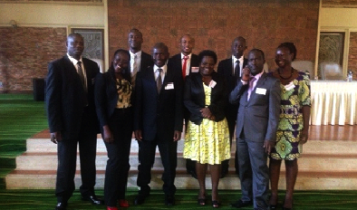Overview of the Public Health Fellowship Program-Field Epidemiology Track (PHFP-FET)
Author: Dr. Alex Riolexus Ario, PHFP Secretariat
The PHFP is a two year, non-degree full-time pro- gram offered on a competitive basis to Ugandan nationals who seek to become leaders in public health practice. The PHFP will be offered in five tracks, namely: Field Epidemiology, Laboratory Systems, Health Informatics, Prevention Effectiveness, and Monitoring and Evaluation. The Field Epidemiology Track (PHFP-FET) commenced in January 2015 with a cohort of 10 Fellows.
The learning scheme consists of didactic learning (20%) and field project-based training (80%). Competency domains include field epidemiology, communications, public health programming, and management and leadership. Fellows show development of these competencies by completing a portfolio of projects in each of these domains.
After the introductory course, 8 Fellows were placed in MoH programs and departments namely: CPHL, ACP, NMCP, UNEPI, Mental Health & Substance Abuse, Epidemiology & Surveillance Division (ESD), Resource Centre, and two were placed in Rakai & Tororo Districts.
In future, fellows will be placed in priority technical units of the MoH, regional level or districts to complete this portfolio under the supervision and mentorship of national and international subject-area experts. The PHFP aims at training transformative leaders in health who are analytical in thinking, who can work effectively in teams and who can integrate inter-disciplinarity in their work. The training methodology takes on a hands-on approach that is guided by four main competency domains mentioned above.
For each domain, fellows must demonstrate multiple competencies by executing projects to ad- dress public health priorities in Uganda. Attachment at field sites accounts for 80% of the experience. The remaining 20% is reserved for Fellows to attend modular trainings, seminars, debates, etc. that are supportive of competency development and linked to the fieldwork.

The PHFP is a two year, non-degree full-time pro- gram offered on a competitive basis to Ugandan nationals who seek to become leaders in public health practice. The PHFP will be offered in five tracks, namely: Field Epidemiology, Laboratory Systems, Health Informatics, Prevention Effectiveness, and During the field attachment, the Fellow is placed under the guidance of a host mentor, and also receives mentorship from the PHFP Secretariat, and from senior technical experts at MakSPH, MOH and CDC. The PHFP builds upon the rich tradition of capacity building at MakSPH.
Since 1994, MakSPH has been con- ducting Master’s level training in Public Health and Health Services Research; training over 300 public health officers who occupy positions of responsibility at different levels of the public health system in Uganda.
In 2002, MakSPH initiated the MakPH-CDC Fellowship Program aimed at enhancing leadership and management capacity of health program managers and leaders in Uganda.
This capacity building program has trained over 85 Fellows in leadership and management of health programs, with over 90% of the graduates occupying senior leadership positions in Uganda and elsewhere. PHFP-FET will subsequently build a critical mass of field epidemiologists to address the public health needs of the country.
……The PHFP aims at training transformative leaders in health who are analytical in thinking, who can work effectively in teams and who can integrate inter-disciplinary in their work

